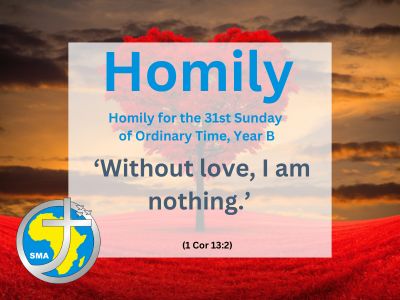Readings: Deuteronomy 6:2-6; Hebrews 7:23-28; Mark 12: 28b-34
Theme: ‘Without love, I am nothing’ (1 Cor 13:2).
In today’s gospel passage from Mark, a scribe asks Jesus to identify the most important commandment of all. Departing from his usual practice of responding to a question by asking another one, Jesus answers the scribe’s question directly. But he mentions two commandments instead of one: love of God and love of neighbour. Why? It wasn’t that Jesus had a problem with maths. The answer is that loving God and neighbour are two sides of the same coin. You cannot have one without the other. The first Letter of John makes it abundantly clear that loving God and loving neighbour are inseparable: ‘Let us love one another since love comes from God, and everyone who loves is begotten by God and knows God. Anyone who fails to love can never have known God, because God is Love’ (1Jn 4: 7-8).
Just how well the early Christian community understood and lived this double commandment of love is illustrated by the testimony of a second century philosopher, Aristides. Writing to the Emperor Hadrian in defence of the Christians he stated that: ‘Christians love one another. They never fail to help widows; they save orphans from those who would hurt them. If one member of the community has something, he gives freely to those who have nothing. They don’t consider themselves brothers and sisters in the usual sense, but brothers and sisters in the Spirit of God. And if they hear that one of them is in jail or persecuted for professing the name of their Redeemer, they give that person what he or she needs. This really is a new kind of person. There is something divine in them.’
We might say that the early Christians lived like a people possessed – possessed by the love of God, so that they could not but love God and love one another in return. Through their experience of the Risen Christ and the outpouring of his Spirit, they had left behind the darkness of night and emerged into the dawning light of God’s love and so their lives were changed utterly. In the words of the poet, William Butler Yeats ‘A terrible beauty [was] born’. Some time ago I came across a memorable story which encapsulates the experience of the first Christians – and, hopefully, our experience as well:
‘There once was a rabbi who was asked by his students, “Master, how should one determine the hour in which night ends and day begins?” One student suggested, “Is it when a person can distinguish a sheep from a dog in the distance?” “No,” said the rabbi, “It is not.” A second student ventured, “Is it when one can distinguish a date tree and a fig tree from afar?” “It is not that either,” replied the teacher. “Please tell us the answer,” the students begged, “How should one determine when night has ended and day begun?” “It is when you look into the face of a stranger and see your sister or brother in need of your love,” said the rabbi. “Until then, we are still in the night.”
Sadly the word ‘love’ is so overused in contemporary parlance that it has lost much of its meaning. Love can be many things, as St Paul, in his letter to Christian Community in Corinth, valiantly strives to catalogue: ‘Love is always patient and kind; it is never jealous, boastful or conceited; it is never rude or selfish; it does not take offence, and is not resentful. Love takes no pleasure in other people’s sins but delights in the truth; it is always ready to excuse, to trust, to hope and to endure whatever comes’ (1 Cor 13:4-7).
We are familiar with the saying that ‘love makes the world go around’. Love is also what makes the ‘merry-go-round’ worthwhile. To quote St Paul again, ‘without love, I am nothing’ (1Cor 13:2). But love is also demanding, for to love means to go beyond ourselves, to rise above our own needs and respond to the needs of others; it means to leave our comfort zones, to give our time, our energy, our talents, and indeed ourselves to others. And to do this not just when we feel in good form good or for a short time, but to do it in season and out of season, in good times and bad, until, in the words of St Paul, our life has been ‘poured out like a libation’ (2 Tim 4:6). By his life, death and resurrection Jesus showed us that to be truly and fully human to to give of ourselves completely and without counting the cost. But we can only do this when we experience ourselves as loved with a love that is unconditional and unlimited – when we experience God’s love for us. I will end my homily I will conclude my homily with this lovely prayer from the pen of Fr Flor McCarthy SDB.
‘If only the heart were right we could give so much more.
Lord open our hearts when they are closed,
Soften them when they are hard,
Warm them when they are cold,
Brighten them when they are dark,
Fill them when they are empty,
Calm them when they are troubled,
Cleanse them when they are sullied,
Heal them when they are wounded
And mend them when they are broken,
So that we, your disciples
May bear the fruits of love. Amen.
Listen to an alternative Homily:

